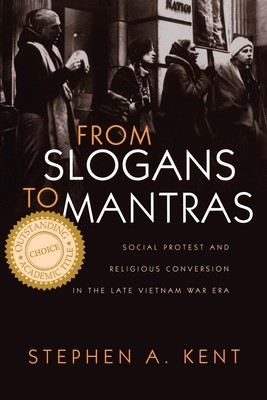
- We will send in 10–14 business days.
- Author: Stephen Kent
- Publisher: Syracuse University Press
- ISBN-10: 0815629486
- ISBN-13: 9780815629481
- Format: 15.4 x 22.7 x 1.6 cm, softcover
- Language: English
- SAVE -10% with code: EXTRA
Reviews
Description
Certainly, religious strains were evident through postwar popular culture from the 1950s Beat generation into the 1960s drug counterculture, but the explosion of nontraditional religions during the early 1970s was unprecedented. This phenomenon took place in the United States (and at the edges of American-influenced Canadian society) among young people who had been committed to bringing about what they called "the revolution" but were converting to a wide variety of Eastern and Western mystical and spiritual movements.
Stephen Kent maintains that the failure of political activism led former radicals to become involved with groups such as the Hare Krishnas, Scientology, Sun Myung Moon's Unification Church, the Jesus movement, and the Children of God. Drawing on scholarly literature, alternative press reportage, and personal narratives, Kent shows how numerous activists turned from psychedelia and political activism to guru worship and spiritual quest as a response to the failures of social protest and as a new means of achieving societal change.EXTRA 10 % discount with code: EXTRA
The promotion ends in 17d.12:11:05
The discount code is valid when purchasing from 10 €. Discounts do not stack.
- Author: Stephen Kent
- Publisher: Syracuse University Press
- ISBN-10: 0815629486
- ISBN-13: 9780815629481
- Format: 15.4 x 22.7 x 1.6 cm, softcover
- Language: English English
Certainly, religious strains were evident through postwar popular culture from the 1950s Beat generation into the 1960s drug counterculture, but the explosion of nontraditional religions during the early 1970s was unprecedented. This phenomenon took place in the United States (and at the edges of American-influenced Canadian society) among young people who had been committed to bringing about what they called "the revolution" but were converting to a wide variety of Eastern and Western mystical and spiritual movements.
Stephen Kent maintains that the failure of political activism led former radicals to become involved with groups such as the Hare Krishnas, Scientology, Sun Myung Moon's Unification Church, the Jesus movement, and the Children of God. Drawing on scholarly literature, alternative press reportage, and personal narratives, Kent shows how numerous activists turned from psychedelia and political activism to guru worship and spiritual quest as a response to the failures of social protest and as a new means of achieving societal change.

Reviews